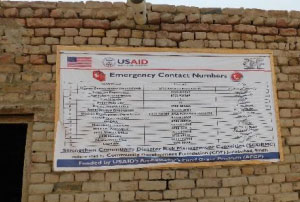“There was no loss of life and property and we were able to put out the fire. We prevented a catastrophe before it was too late,” Ghulam Ishaq recalls proudly. “Fire brigade was late in coming to the incident site, but our ERT was in place and each member knew what to do and how to do it” said a 25-year-old Ishaq who is also chairman of Emergency Response Team (ERT) of village Abdul Hameed Hanji, Jacobabad, Sindh.
When the fire erupted in his village, Ishaq and his team immediately called the fire brigade as they doused water to put out flames and rescued children, women, and the elderly, trapped in burning houses. They used medicines from the first aid kit to treat the wounds of the injured. Their rescue efforts did not only save lives but also prevented serious loss to property.

Ishaq attributes this success to the preparedness training he received from Community Development Foundation (CDF) as part of a project funded by USAID Ambassador’s Fund Grant Program. The 11-month project aimed at increasing disaster-preparedness of target community.
They built and enhanced disaster-preparedness capacities of 10,436 residents (5,322 women and 5,114 men) from 15 target villages. All together 15 ERTs for as many villages in Union Council Ahmedpur were also established and trained on how to respond to a disaster situation. The villagers were also sensitized on the importance of first aid services and trained on techniques to administer them.
Emergency Response Team (RT) in each village sensitized villagers and prepared them for the worst, through technical trainings and mock drills. They have also built strong coordination systems with government officials, ensuring better preparedness, resulting in more safeguards against disasters. This intervention will go a long way in improving the preparedness of the communities against disasters.
Ishaq has retained what he learned during trainings. However, he did not fully realize the value of this knowledge until the fire erupted.

Talking about his experience in retrospect, Ishaq said, “In Jacobabad, we regularly face disasters. Villagers are, therefore, required to be aware enough to properly handle any emergency. Prior to the formation of ERTs”, he explained, “we did not have an iota of understanding on how to do pre-planning or react during and after disastrous situations. We would act in an unorganized manner, which sometimes would result in great loss of human lives and other valuables, especially livestock.”




















